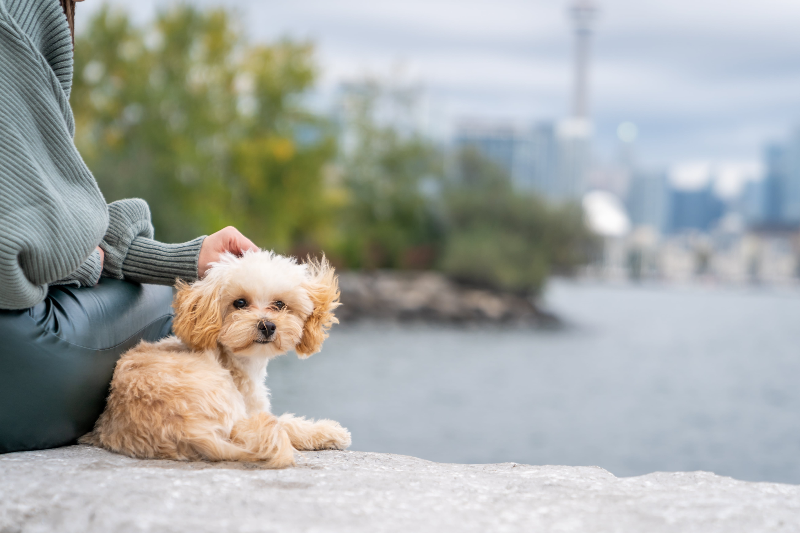What Responsible Chihuahua Ownership Really Means: Expert Advice from Darya of AppleGarden Chihuahuas
Updated on Oct 29, 2025 12:31 AM UTC
Thinking About Getting a Chihuahua?
If you’ve ever fallen in love with the bright eyes and big personality of a Chihuahua, you’re not alone. But behind every confident, happy Chihuahua is a thoughtful beginning that starts with a breeder who values health, temperament, and breed preservation as much as you value finding your perfect companion.It’s clear when speaking with Darya at AppleGarden Chihuahuas, located in Southern Ontario, that her dogs are family. The small, preservation-focused breeding program is built on a passion for producing beautiful, healthy, and sound Chihuahuas that proudly represent their breed.
Breeding With Purpose, Not Popularity
The AppleGarden goal is simple but not easy to achieve, Darya explains,“ it is to produce Chihuahuas that are consistent in standard, health, and temperament. Each breeding decision is guided by long-term vision rather than short-term demand.”Every adult dog is health screened following OFA guidelines for eyes, patellas, and heart health, and DNA-tested through Embark for hereditary conditions. Beyond the science, AppleGarden evaluates their dogs in Conformation and Performance events, which allows them to assess both mental and physical soundness.
The fact that Darya is so engrained in the dog community ensures that every puppy not only meets the breed standard but has the temperament to live a happy, balanced life as a cherished companion.
A responsible breeder like Darya of AppleGarden says, “I view the puppy sale as a collaborative process between breeder and buyer. Both sides have an important role to play in finding the right fit. However, many people approach breeders with the mindset that the price of the pup is the only deciding factor. It’s not. A reputable breeder won’t place a dog simply because someone can pay the price - just like a Pekingese breeder wouldn’t sell to someone wanting a daily jogging partner.”
Why the Puppy Process Should Be Collaborative
What if Darya told you that buying a puppy isn’t a transaction but instead a partnership?A responsible breeder like Darya of AppleGarden says, “I view the puppy sale as a collaborative process between breeder and buyer. Both sides have an important role to play in finding the right fit. However, many people approach breeders with the mindset that the price of the pup is the only deciding factor. It’s not. A reputable breeder won’t place a dog simply because someone can pay the price - just like a Pekingese breeder wouldn’t sell to someone wanting a daily jogging partner.”
Good breeders are educators for their breed. They spend countless hours explaining the Chihuahua’s temperament, needs, and health, sacrificing personal time to help future owners make informed decisions. When you reach out to a preservation breeder like Darya, you’re not buying a puppy; you’re investing in a relationship built on trust and shared values.
How to Recognize a Reputable Breeder
If you’re researching where to find your Chihuahua, here are a few essential questions Darya recommends to ask:- Purpose: Why do they breed? What are their goals and values?
- Health Testing: Do they follow OFA guidelines and perform DNA screening of the parent dogs of their litters?
- Active Involvement: Do they train, compete, or participate in dog sports to uncover the dogs’ mental and physical soundness. And, do they use those dogs in their breeding programs?
- Avoid Gimmicks: Beware of misleading marketing terms like “teacup sized”, “deer head,” or “baby face.” Most reputable breeders don’t speak like this and are much more likely to speak about their dogs in terms of a breed standard.
- Communication Style: Do they listen, educate you with their answers to questions, and maintain clear communication? Have they indicated that they are willing to be there to support you with ongoing questions once you bring home your new pup?
- Meeting You: You may not always be invited into their home, but you can often meet at a dog event to see their dogs in action. Finding a breeder whose philosophy aligns with yours sets the stage for a lifelong partnership.
What It Takes to Run a Quality Breeding Program
Darya explains that building an ethical Chihuahua line doesn’t happen overnight. It takes years of planning, evaluation, and dedication.
At AppleGarden, Darya describes that, “every breeding is part of a multi-generational vision. With small litters, each puppy is carefully evaluated, and “keepers” are chosen to move the program forward. This approach ensures that every generation improves upon the last physically, mentally, and genetically. This is referred to as breeding a line.”
Darya also explains that the best breeders often collaborate, not compete. Sharing access to quality stud dogs and diverse genetics strengthens the breed as a whole. AppleGarden proudly works within this community of like-minded breeders who put the breed’s future above individual gain.
Preparing for Life With Your Chihuahua Puppy
Bringing a Chihuahua puppy home is an exciting moment and the beginning of an important responsibility. Darya shares with us the key concepts that new owners should know:1. Create a Familiar Space
Set up your puppy’s area just like it was at the breeder’s home with a bed, crate, potty area. This reduces stress and helps the puppy settle in smoothly.2. Be on the Watch for Hypoglycemia
Chihuahuas, especially puppies under eight months, with their tiny frames can experience low blood sugar after too much excitement or not enough rest.- Pause playtime often - every 15 minutes for younger pups, every 30 minutes for older ones.
- Offer food and water during these breaks.
- If your puppy becomes wobbly, pale, or lethargic, provide a small snack or a bit of Nutri-Cal, and contact a vet if symptoms persist.
3. Potty Training Is a Team Effort
Even a trained puppy can have accidents during play. Take your Chihuahua out 20 minutes after meals and frequently during activity. Remember that accidents are learning opportunities, not reasons for scolding.4. Avoid Stairs Early On
Until around six months of age, puppies should not climb stairs to prevent joint and back problems later in life. Baby gates are your friend. Your puppy’s spine will thank you in the future.5. Smart Socialization
Limit early social sessions to 20 minutes. Gradually introduce new environments, sounds, and people. Avoid public dog parks where unknown dogs may carry illnesses or display poor manners. Build your puppy’s confidence step by step.6. Teach Awareness at Home
Rather than walking unnaturally to avoid stepping on your puppy, let them learn to navigate around you. This builds awareness and self-confidence for life outside of the home too.7. Early Grooming Habits
From day one, gently handle your puppy’s paws, gums, and teeth.- Start with a Q-tip to clean teeth and transition to an enzymatic toothpaste.
- Trim nails one paw at a time with treats and praise. Small, positive experiences now make lifelong grooming stress-free.


